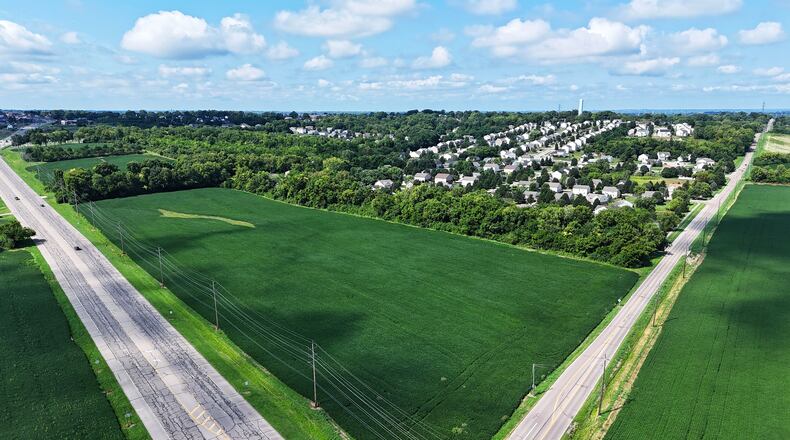Mayor Keith Funk, Vice Mayor Christina McElfresh and council member Dr. Kelly Clark voted for the zoning change from rural residential to general residential zoning. Council members Michael Graves, Tom Hagedorn and Ben Wagner opposed.
Since the vote was 3-3, the ordinance failed. There are six council members because John Centers resigned his seat last month due to personal reasons.
Those who opposed the ordinance packed one side of council chambers, and after several of those spoke during the visitors portion of the meeting, tensions rose as Funk tried to explain why he supported the legislation.
People interrupted him from their seats and Funk told them they already had their chance to address council. At one point, a Monroe police officer entered from the back of the room and stood near the residents.
Matt Mains from Drees Company earlier said the developer planned to build a mix of single-family and townhomes on the property with 2.45 units per acre. He said the smaller lots would allow Drees to have a price point in the $400,000 range.
Development Director Tom Smith said this development addressed a community need in housing stock diversification. Drees intended to develop single-unit detached homes toward the south side of the project, and attached housing to the northern part.
Attached housing has been identified as an important development type for Monroe to achieve since the city is nearly 90% single-family detached, according to a staff report.
The ordinance was earlier approved 5-0 by Planning Commission and city staff, but the change in the legislation will take the proposed legislation change “back to the drawing board,” Funk told the Journal-News after the meeting.
The residents adamantly opposed changing the zoning, saying their concerns included increased traffic congestion, strain on public services and schools, loss of open space and erosion of Monroe’s rural ambiance.
After the meeting, some of those residents celebrated the council’s vote outside the chambers.
Bobbie Drew, who has lived in Monroe for 13 years, said she was surprised the ordinance failed, but thankful because “not one single person in this town” wanted that development.
Drew, who is running for school board, said she wants the city to “let the schools catch their breath” before any new residential developments.
“I think half of council listened” to residents’ concerns, she said.
Wes Bake, whose family lives across the street from the development on Cincinnati-Dayton Road, said he’s not opposed to change, but it’s happening quickly.
“I just want to slow it down as much as possible,” he said after the meeting. “I don’t think I can stop it.”
Graves, who has lived in Monroe for more than 20 years, said he voted no after listening to residents’ concerns, those expressed at the meetings, on social media and at the grocery store.
Residents want the “small town feel” in the city not to disappear with major developments, he said.
“We have an idea what we want in the city. and we have an idea, maybe a stronger idea, of what we don’t want to grow into,” he said after the meeting. “That’s the concern.”
About the Author


